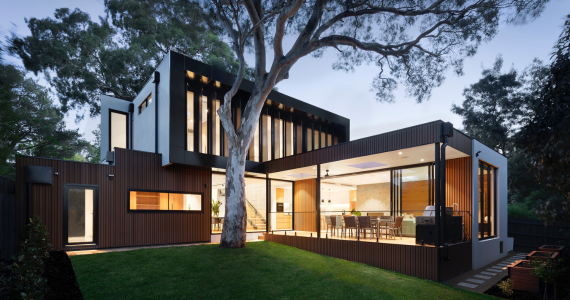When it comes to purchasing a property, there are two main options to consider: buying an established property or opting for a new one. Each choice comes with its own set of benefits and considerations. By carefully considering factors including those outlined below, you will be able to find a home that aligns with your property goals and preferences. The benefits and considerations are not limited to what is listed below, and you should seek professional advice to suit your own individual circumstances.

Established property benefits
Established infrastructure: older properties are often situated in areas with more developed infrastructure, including trains, buses, trams, schools, hospitals and other amenities. Please refer to page 7 in the It’s My Home magazine for a comprehensive list of amenities that you should consider when evaluating a property for purchase. Remember well-established facilities play a crucial role in enhancing the growth potential of the property. Physical inspection: you can physically inspect the property before making a purchase. This allows you to assess the condition of the property, identify any potential issues, and make an informed decision based on your observations.
Property comparison: you can compare the property you’re interested in, with similar properties that have recently sold in the area. This comparison helps you estimate the value of the property and ensure that you’re making a reasonable investment.
Proven resale value: purchasing an established property usually means you will have access to its history, including previous sale prices and property records.
Value enhancement: by investing in an older property, you have the opportunity to add value through renovations and improvements. Even a simple cosmetic makeover to the interior can significantly enhance the property’s value, rentability and rental return. This means that you can leverage your skills and creativity to make the property more appealing.
Things to consider
Maintenance & repairs: purchasing an established property entails being prepared for unexpected maintenance and repair costs. Older properties may require more frequent repairs, and it’s important to have a financial buffer to handle such expenses.
Rental returns: older properties may see lower rental returns compared to newer properties. This may be because tenants often prefer newer properties with modern amenities and features. To attract tenants and maintain steady rental income, you may need to consider factors such as upgrading the property or offering competitive rental rates.
Tenant appeal: tenants may prioritise newer properties with a modern look and feel. This means that older properties may have less appeal to potential tenants. To maximise the properties rental return, you may need to consider ways to make it more attractive to tenants, such as updating the interior or offering additional amenities.
New property benefits
Attractions for tenants: highly attractive to tenants due to their contemporary design and amenities. This may lead to higher rental rates compared to established properties and can increase your chances of securing reliable and desirable tenants.
Builder’s warranty: buying a new property usually comes with the benefit of a builder’s warranty. This warranty is intended to provide protection against any structural or construction-related issues that may arise during the initial years of ownership. However, it’s important to note that the specifics of the builder’s warranty can vary between States. For instance, in New South Wales, it is referred to as the Home Building Compensation Fund. To ensure you have a clear understanding of the warranty coverage in your State, it is crucial to research and familiarise yourself with the terms and conditions of the building contract. Ensure you understand who is covered and the extent of the coverage.
Customisation options: in some cases, purchasing a new property offers the opportunity for customisation. Depending on the stage of construction, you may have the ability to choose certain finishes, materials, or even floor plans, allowing you to personalise the property according to your preferences and needs.
Minimal maintenance: since everything in a new property is under the builder warranty, you can expect fewer issues and repair expenses in the short term. This allows you to focus more on enjoying your property rather than dealing with any unexpected maintenance tasks.
Modern amenities and technologies: new properties are usually designed with modern amenities and technologies already installed. From energy efficient heating systems to smart home features, these pre-installed advancements offer convenience, efficiency, and a higher level of comfort for both residents and investors. The appeal of these modern features can attract high-quality tenants.
Things to consider
Affordability: it’s important to note that new properties can often come with a higher price tag. Developers will usually factor in their margins and marketing costs and in some cases you may pay more compared to established properties in the same area.
Construction timelines and financial considerations: if you decide to purchase a new property off the plan, you may face the challenge of waiting for the property to be built. It’s crucial to have a financial plan in place to cover your expenses during the construction phase and be prepared for potential pushback of the settlement date.
Limited value-adding opportunities: unlike older properties, new properties may offer limited opportunities to add value through renovations or improvements. This means that achieving capital growth may take longer, as you won’t have the option to make significant changes that could potentially increase the property’s value.
Market saturation: in areas that have been recently zoned for development, there is a risk of market saturation (an oversupply of properties). This may lead to increased competition and difficulty finding tenants for your property. Further, market saturation can also impact the resale potential of a property. With a surplus of similar properties available, it may take longer to sell the property due to increased competition.
Strata: when purchasing an apartment, townhouse, or villa, it’s important to note that new properties often come with modern amenities like gyms, swimming pools, saunas, lifts and more. While these facilities enhance your lifestyle, it’s important to be aware that they can lead to higher strata costs. As the owner, you’ll be responsible for a share of these ongoing fees.
Source: Helia – It’s my home magazine
This publication has been produced by Helia Group Limited (’Helia’). This publication may include content which is owned by third parties (’third party content owners’) and that has been provided to Helia for publication. Opinions expressed in this publication are of the writer or contributor and do not necessarily reflect the view of Helia or its affiliates. This publication covers a variety of topics including property, insurance and other financial products and services. Although some of the information involves tax, stamp duty, legal, accounting, financial or similar issues, Helia, its affiliates and the third-party content owners (as to their materials only) (‘we’) are not in the business of offering such advice and nothing in this publication constitutes a personal recommendation or advice. You must consult with your own professional advisers to examine the legal, tax, accounting or investment aspects of any information presented in this publication and how they may affect your particular situation.
The information also does not contain all of the applicable terms, conditions, limitations or exclusions of the products or services described. We expressly disclaim all responsibility and liability for any action or inaction by you in reliance or partial reliance on any material, information, opinion or advice in this publication or referred to in this publication. The information is current as at the date of publication but may change without notice. We are under no obligation to update the information or correct any inaccuracy which may become apparent at a later date. We do not take any responsibility for any reliance on the information contained in this publication or for its reliability, accuracy or completeness. Nothing in this publication is an offer by or on behalf of Helia or its affiliates to sell, or solicit an offer to buy, any security or financial product.
COPYRIGHT NOTICE All copyright in the contents of this publication belong to Helia, its affiliates and licensors or to third party content owners. All rights are reserved. To the extent permitted by law, no part of any materials in this publication may be reproduced or transmitted in any form without the express written consent of Helia.


